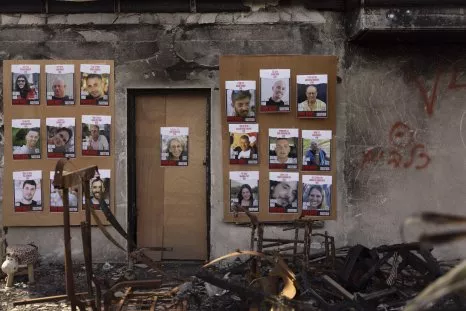Israel's Next War Looms Behind Gaza Carnage
Israel's grinding war in the Gaza Strip has become a multi-front conflict, as relatively low-intensity face-offs with Iranian-aligned forces in Lebanon, Syria, Iraq and Yemen all threaten to ignite a regional conflagration.
Israel's northern border with Lebanon—the southern portion of which is controlled by the Hezbollah militant organization—is one of the wider conflict's most dangerous flash points. This week, the Israel Defense Forces (IDF) launched airstrikes against Hezbollah command sites in southern Lebanon, to which the group responded with rocket salvos into northern Israel.
Exchanges of fire along the frontier have been near constant since Hamas' surprise October 7 attack on southern Israel. Hezbollah and Israel are yet to enter into a full-scale war, but Israeli national security adviser Tzachi Hanegbi said this month that escalation is a possibility.
"We can no longer accept [Hezbollah's elite] Radwan force sitting on the border," he said. "We can no longer accept Resolution 1701 not being implemented," he added, a reference to the 2006 United Nations Security Council resolution prohibiting any Hezbollah presence south of the Litani River, some 18 miles north of the Israeli border.
"The situation in the north must be changed," Hanegbi said. "And it will change. If Hezbollah agrees to change things via diplomacy, very good. But I don't believe it will."
Axios reported this week that Israeli leaders are pushing their American allies on the matter, demanding Hezbollah be pushed back around 6 miles from the Israeli border.
A National Security Council spokesperson told Newsweek that President Joe Biden "has made clear that we do not support this conflict expanding into Lebanon. From the beginning, his message to any actor seeking to exploit the situation has been clear: don't."
"The United States has strengthened our own deterrent posture in the region and we are committed to helping restore calm along the Blue Line through a combination of deterrence and diplomacy," the spokesperson added.
"White House, State Department, and Defense Department officials have been in close contact with Israeli and Lebanese counterparts to work towards this end, so both the Israelis and Lebanese can return to their homes and live in peace and stability."
But despite U.S. efforts, the situation remains tense. Michael Allen, who served as special assistant to President George W. Bush and as the senior director at the National Security Council, told Newsweek: "Every single day, there's another huge hint that the Israelis want to go there."
"We don't believe that Hezbollah will attack because Iran wants them to be viable," Allen—who is now the managing director of the Beacon Global Strategy strategic advisory firm—added.
"Iran needs them as a deterrent in case Israel struck the nuclear facilities. They want it to be in Israel's calculation that if they were ever to launch a strike inside of Iran proper, Hezbollah would rain down thousands of sophisticated missiles," he said.
"But it's the Israelis who seemingly want it to happen because of their new psyche," Allen said, referring to the collective feeling of insecurity prompted by Hamas' October 7 attack.
"I think things are very dicey and will be for perhaps the first quarter of next year," Allen said, suggesting that the ongoing offensive into Gaza will not necessarily mark the end of tensions involving American forces in Syria, Iraq, and the Red Sea.
Members of Biden's administration, Allen said, acknowledge that Israel will likely need to continue their Gaza offensive well into January.
"They need to hit some metrics," Allen said of the IDF, such as killing Hamas' Gaza leader Yahya Sinwar and collapsing the majority of militant tunnels in the Strip.
The White House and some of its European allies are pushing Israel to ease off its devastating Gaza operation, and transition to a lower intensity form of warfare focus on Hamas leadership and specific military infrastructure targets.
"I think the White House is trying to have its cake and eat it too," Allen said, noting the gap between the administration's public appeals for restraint and the continued behind the scenes support for Israel.
Update 12/22/23, 4:42 a.m. ET: This article has been updated to include comment from the White House National Security Council.
Disclaimer: The copyright of this article belongs to the original author. Reposting this article is solely for the purpose of information dissemination and does not constitute any investment advice. If there is any infringement, please contact us immediately. We will make corrections or deletions as necessary. Thank you.


